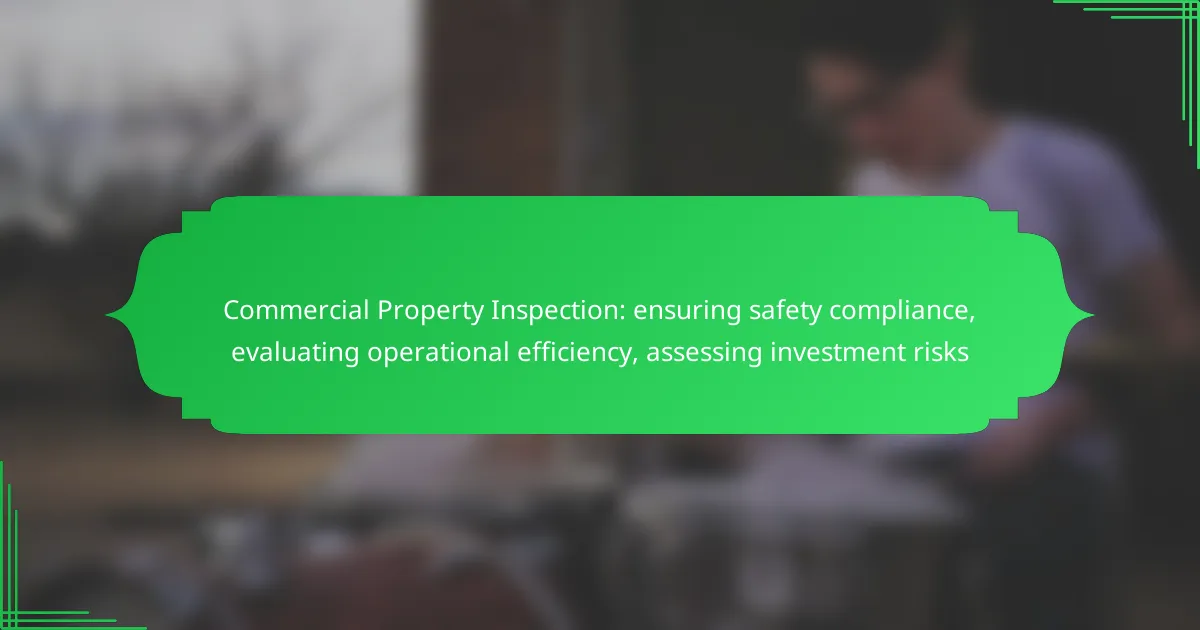Commercial property inspections are vital for assessing safety compliance, operational efficiency, and investment risks. By systematically evaluating a property’s condition and adherence to regulations, these inspections provide property owners and investors with crucial insights that help safeguard their assets and enhance their value.

What are the key benefits of commercial property inspections?
Commercial property inspections provide essential insights into safety compliance, operational efficiency, and investment risks. These evaluations help property owners and investors make informed decisions, ensuring that their assets are safe, functional, and valuable.
Ensuring safety compliance
Safety compliance is a critical aspect of commercial property inspections. These evaluations identify potential hazards, ensuring that properties meet local safety regulations and standards. Regular inspections can help prevent accidents and liabilities, protecting both tenants and owners.
Property owners should prioritize inspections for fire safety, electrical systems, and structural integrity. For instance, ensuring that fire exits are accessible and that electrical wiring is up to code can significantly reduce risks.
Evaluating operational efficiency
Evaluating operational efficiency through inspections helps identify areas where properties can improve performance and reduce costs. This includes assessing HVAC systems, plumbing, and energy usage to ensure they operate optimally.
For example, an inspection may reveal that an outdated HVAC system is consuming excessive energy, prompting an upgrade that could lower utility bills by a significant percentage. Regular assessments can lead to better resource management and cost savings.
Assessing investment risks
Assessing investment risks is crucial for potential buyers or investors in commercial properties. Inspections provide a clear picture of the property’s condition, helping to identify issues that could lead to costly repairs or decreased value.
Investors should consider conducting thorough inspections before purchasing a property. This proactive approach can uncover hidden problems, allowing for better negotiation on price or terms, ultimately safeguarding the investment.
Enhancing property value
Enhancing property value is a significant benefit of regular inspections. By maintaining compliance and operational efficiency, property owners can increase the overall marketability and worth of their assets.
For instance, properties that are well-maintained and compliant with safety regulations often attract higher rental rates and longer lease terms. Investing in regular inspections can lead to a more valuable asset over time.
Improving tenant satisfaction
Improving tenant satisfaction is essential for retaining tenants and ensuring steady income. Inspections help identify and resolve issues that could affect tenant comfort and safety, such as plumbing leaks or inadequate heating.
Property owners should communicate the importance of inspections to tenants, emphasizing that these evaluations contribute to a safe and pleasant living or working environment. Satisfied tenants are more likely to renew leases, reducing turnover costs.

How do commercial property inspections ensure safety compliance?
Commercial property inspections ensure safety compliance by systematically evaluating the building’s adherence to local codes and regulations. These inspections identify potential hazards, assess fire safety measures, and evaluate the structural integrity of the property, ultimately protecting occupants and minimizing liability for owners.
Identifying code violations
Identifying code violations is a critical aspect of commercial property inspections. Inspectors review the property against local building codes, zoning laws, and safety regulations to uncover any non-compliance issues. Common violations may include improper electrical wiring, inadequate plumbing systems, or insufficient accessibility features for individuals with disabilities.
Property owners should prioritize rectifying these violations promptly to avoid fines and legal repercussions. Regular inspections can help maintain compliance and ensure that any changes in local regulations are addressed in a timely manner.
Evaluating fire safety measures
Evaluating fire safety measures involves assessing the effectiveness of fire alarms, sprinkler systems, and emergency exits. Inspectors check whether these systems are up to code and functioning correctly, as well as ensuring that fire extinguishers are accessible and properly maintained. This evaluation is crucial for protecting lives and property in the event of a fire.
Property owners should conduct regular fire safety drills and inspections to ensure that all safety measures are operational. Compliance with fire safety regulations can vary by region, so it’s essential to stay informed about local requirements.
Assessing structural integrity
Assessing structural integrity focuses on the building’s overall stability and safety. Inspectors examine foundations, walls, roofs, and other critical components for signs of deterioration or damage. Common issues include cracks in walls, sagging roofs, or water damage, which can compromise the safety of the structure.
Property owners should address any identified structural issues immediately to prevent further damage and ensure the safety of occupants. Regular assessments can help catch problems early, potentially saving significant repair costs in the long run.

What are the steps involved in a commercial property inspection?
A commercial property inspection typically involves a systematic approach to evaluate the property’s condition, compliance with safety regulations, and overall operational efficiency. The process helps identify potential investment risks and ensures that the property meets necessary standards.
Initial assessment
The initial assessment begins with a visual inspection of the property’s exterior and interior. Inspectors look for obvious signs of damage, such as cracks in the foundation, roof issues, or water damage. This step helps determine if a more detailed examination is warranted.
During this phase, inspectors may also review relevant documents, including previous inspection reports, maintenance records, and compliance certificates. This background information is crucial for understanding the property’s history and any ongoing issues.
Detailed examination
The detailed examination involves a thorough inspection of all systems within the property, including electrical, plumbing, HVAC, and structural components. Inspectors often use specialized tools to assess the condition of these systems, ensuring they operate efficiently and safely.
Common areas of focus include checking for code violations, assessing energy efficiency, and identifying any potential hazards. For example, inspectors may evaluate the insulation levels and energy consumption to recommend improvements that could lower operational costs.
Reporting findings
After the inspection, a comprehensive report is generated that outlines the findings, including any deficiencies and recommendations for repairs or upgrades. This report serves as a critical document for property owners, potential buyers, and investors.
It’s essential that the report is clear and detailed, highlighting urgent issues that require immediate attention and categorizing findings by severity. This structured approach helps stakeholders make informed decisions regarding the property’s future and potential investment risks.

What criteria should be used to select a commercial property inspector?
Selecting a commercial property inspector requires careful consideration of their qualifications, experience, and client feedback. These criteria ensure that the inspector can effectively evaluate safety compliance, operational efficiency, and investment risks associated with the property.
Qualifications and certifications
Inspectors should possess relevant qualifications and certifications that demonstrate their expertise in commercial property inspections. Look for credentials such as Certified Commercial Property Inspector (CCPI) or membership in professional organizations like the International Association of Certified Home Inspectors (InterNACHI).
Additionally, ensure that the inspector is familiar with local building codes and regulations, which can vary significantly by region. This knowledge is crucial for identifying compliance issues that could affect the property’s value and safety.
Experience in the industry
Experience plays a vital role in the effectiveness of a commercial property inspector. Ideally, the inspector should have several years of experience specifically in commercial properties, as residential and commercial inspections can differ greatly.
Consider asking for examples of past inspections they have conducted, particularly in similar types of properties. An inspector with a strong background in your property type will be better equipped to identify potential issues and provide valuable insights.
Client reviews and testimonials
Client reviews and testimonials offer insight into the inspector’s reliability and quality of service. Look for feedback on platforms like Google Reviews or Yelp, focusing on comments about thoroughness, professionalism, and communication.
Request references from the inspector and follow up with previous clients to gauge their satisfaction. A reputable inspector should be willing to provide this information, which can help you make a more informed decision.

What tools are commonly used in commercial property inspections?
Commercial property inspections utilize a variety of tools to ensure safety compliance, evaluate operational efficiency, and assess investment risks. These tools range from basic handheld devices to advanced technology, each serving a specific purpose in the inspection process.
Inspection Software
Inspection software is essential for organizing data collected during property evaluations. It allows inspectors to create detailed reports, track issues, and manage follow-ups efficiently. Popular options include software that integrates with mobile devices, enabling real-time data entry and photo documentation.
Moisture Meters
Moisture meters are crucial for detecting water damage and potential mold growth in commercial properties. These devices measure moisture levels in walls, ceilings, and floors, helping inspectors identify areas that may require further investigation or remediation. Regular use of moisture meters can prevent costly repairs and health risks associated with mold.
Thermal Imaging Cameras
Thermal imaging cameras detect heat patterns and temperature variations, revealing hidden issues such as electrical faults or insulation gaps. These cameras can identify problems that are not visible to the naked eye, making them a valuable tool for thorough inspections. They are particularly useful in older buildings where structural integrity may be compromised.
Electrical Testing Equipment
Electrical testing equipment, including multimeters and circuit testers, is vital for assessing the safety and functionality of electrical systems in commercial properties. Inspectors use these tools to check voltage levels, continuity, and grounding, ensuring compliance with safety standards. Regular electrical inspections can help prevent hazards such as fires or electrical failures.
Gas Detectors
Gas detectors are essential for identifying leaks of hazardous gases, such as carbon monoxide or natural gas, which can pose serious health risks. These portable devices provide immediate readings and alerts, allowing inspectors to address potential dangers quickly. Regular checks with gas detectors are crucial for maintaining safety in commercial spaces.
Safety Gear
Safety gear, including hard hats, gloves, and safety glasses, is necessary for inspectors to protect themselves while conducting evaluations. Proper safety equipment ensures that inspectors can navigate potentially hazardous environments without risk of injury. Adhering to safety protocols is essential for compliance and overall inspection integrity.
